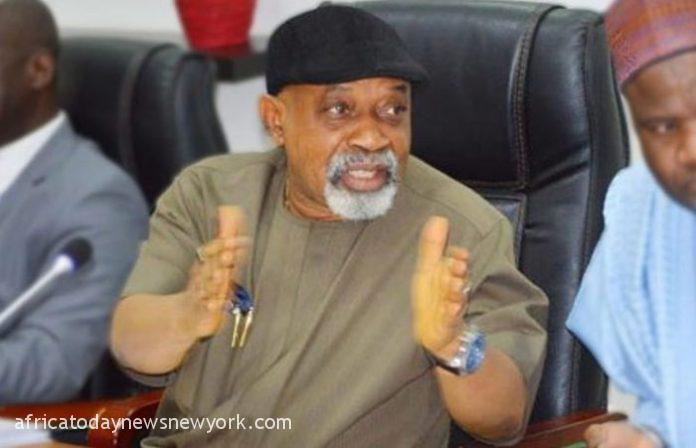The Federal Government of Nigeria will no longer tolerate strike that does not follow due process by any union, during this transition period present President Muhammadu Buhari-led administration according to the Minister of Labour and Employment, Sen. Chris Ngige.
Ngige fired this warning on Thursday, shortly after receiving an ‘Award of Excellence,’ which was conferred on him by the Nigerian Association of Resident Doctors (NARD) at the 42nd Annual General Meeting/Scientific Conference of the association. The award was presented to him by the immediate past executive of NARD, which led the new executive on a courtesy/thank you visit his office in Abuja.
During the visit, the new leadership also seized the opportunity to highlight concerns of the doctors, chief of which is the review of the Consolidated Medical Salary Scale (CONMESS) wage structure. Others are the correction of some minor errors in the circular on upward review of the Medical Residency Training Fund (MRTF), non-taxation of the call duty allowance and non-payment of the new hazard allowances to house officers.
While offering comments on the review of CONMESS, Ngige pointed out that a committee had already been put in place at the Federal Ministry of Health, which was working internally for the time being, but would swing into action next week, to dialogue with the resident doctors and members of the Joint Health Sector Union (JOHESU).
He told the doctors that there was no need for them to issue strike threat when the government had put a process in motion to address their concerns.
He said: ‘The Federal Government will no longer tolerate strike that does not pass through due process by any union, until the end of President Muhammadu Buhari administration in May next year. Any group that embarks on strike will be visited with Section 43 of the Trade Dispute Act (TDA), Laws of the Federation of Nigeria (LFN) 2004, which says that when a worker goes on strike, especially those on essential services, the employer can also refuse to pay compensation or wages which accompanies work done.
“The due process of a strike is that social dialogue negotiation with employers should be explored first and in the event of the failure, the Federal Ministry of Labour and Employment office in the affected state/Federal Capital Territotry should be notified and finally, a Trade Dispute Notice (TDN) served.”
Read Also: Tinubu Vs Obi: I Will Make Up My Mind At Polling Unit – Ngige
Ngige went on to advise all aggrieved unions to emulate the doctors and commence proactive discussions with the Federal Government, rather than resort to strike whenever issues arose.
Reacting to the circular on upward review of the Medical Residency Training Fund (MRTF), he assured that the National Salaries, Incomes and Wages Commission was working on it, adding that the area of domiciliation of the fund for residents would be addressed during negotiation to align it with the National Residency Training Fund Act, which is the guiding law, saying a circular derives its life from extant law.
According to him, the issue of non-payment of new hazard allowance to house officers was being addressed by the Office of the Accountant General of the Federation, as there was an inadvertent error in the submission of their list from the Medical and Dental Council of Nigeria (MDCN).
Ngige assured that the house officers would get their money, since they were captured in the payment.
He, however, said the Federal Government cannot stop the taxation of the call duty allowance of the doctors, since it falls under the Personal Income Tax Act (PITA) tax, to be paid to the states under pay-as-you-earn (PAYE), which is deducted by IPPIS on behalf of the state where a medical institution is located.
‘The Federal Government does not take the personal income tax. It belongs to the states where your hospitals are domiciled. The Federal Government has no right to tell the states what to do on this matter. The states have the right to collect the tax or grant waiver to you if they chose, but in granting you waiver, they must inform the Joint Tax Board (JTB), so that the Federal government is not later made to bear that tax as happened in the past.’
‘This is one of the reasons why the Academic Staff Union of Universities (ASUU) is running away from the Integrated Payroll and Personnel Information System (IPPIS) platform of the government. Before IPPIS, the JTB once billed the Federal Government about N800 billion as shortfall of personal income tax, not paid to the states for four years. As doctors, I expect you to pay tax. What you should be asking for is enhanced pay.’
On the foreign exchange training for residents, Ngige said: ‘You also talked about reintroduction of exchange programme whereby doctors are sent abroad to sharpen their skills and then, they return home to render services to the country. Some of my classmates in the medical school benefitted from the exchange programme and were paid allowances daily in hard currency by the government. Some of them returned home and immediately bought Mercedes Benz cars from the money that they saved, which is good, but today, the government doesn’t have foreign exchange. The exchange rate today is N740 to one dollar in the parallel market. So, we cannot afford it.’
Concerning the request of NARD to get the check off dues of house officers, Ngige said his ministry cannot guarantee such, since the association has not been registered as a trade union.

